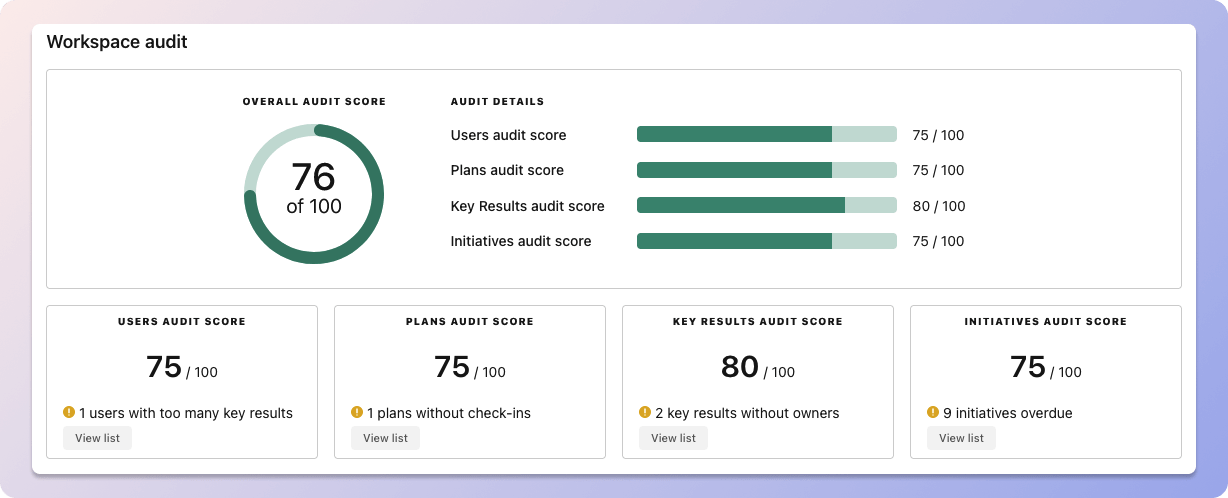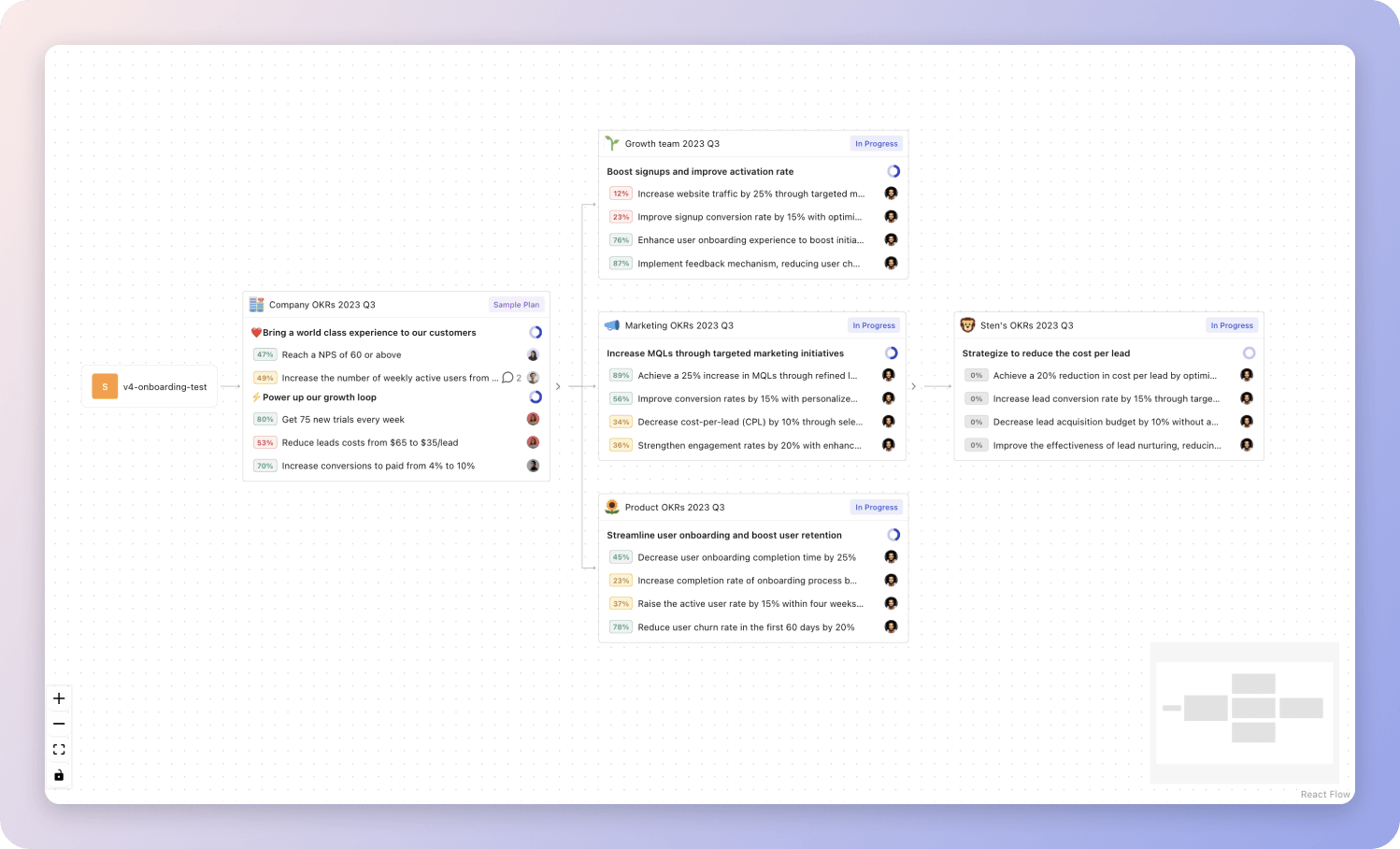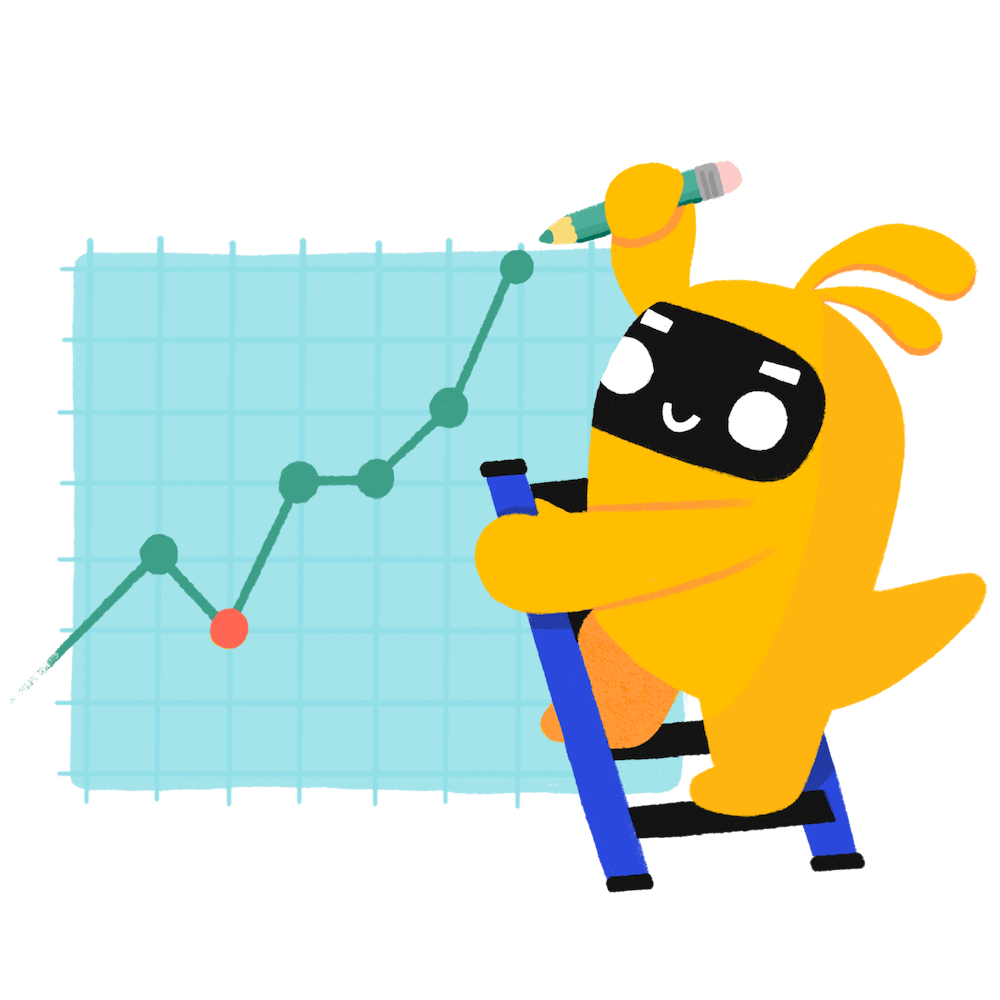13 customisable OKR examples for Performance Management Team
What are Performance Management Team OKRs?
The OKR acronym stands for Objectives and Key Results. It's a goal-setting framework that was introduced at Intel by Andy Grove in the 70s, and it became popular after John Doerr introduced it to Google in the 90s. OKRs helps teams has a shared language to set ambitious goals and track progress towards them.
Crafting effective OKRs can be challenging, particularly for beginners. Emphasizing outcomes rather than projects should be the core of your planning.
We have a collection of OKRs examples for Performance Management Team to give you some inspiration. You can use any of the templates below as a starting point for your OKRs.
If you want to learn more about the framework, you can read our OKR guide online.
Building your own Performance Management Team OKRs with AI
While we have some examples available, it's likely that you'll have specific scenarios that aren't covered here. You can use our free AI generator below or our more complete goal-setting system to generate your own OKRs.
Feel free to explore our tools:
- Use our free OKR generator
- Use Tability, a complete platform to set and track OKRs and initiatives, including a GPT-4 powered goal generator
Our customisable Performance Management Team OKRs examples
You'll find below a list of Objectives and Key Results templates for Performance Management Team. We also included strategic projects for each template to make it easier to understand the difference between key results and projects.
Hope you'll find this helpful!
1. OKRs to improve quarterly communication by ensuring consistent check-ins with performance manager
Improve quarterly communication by ensuring consistent check-ins with performance manager
Act on and document any action items or feedback from check-in meetings
Record all feedback and action items during check-in meetings
Update documentation promptly following the actions taken
Implement necessary changes based on the meeting feedback
Prepare performance update report prior to each check-in meeting
Analyze data to identify trends
Gather recent data on team performance metrics
Compile findings into a concise report
Schedule quarterly meeting dates with performance manager in advance
Contact performance manager to discuss availability
Confirm and schedule quarterly meetings in advance
Review the calendar for potential meeting dates
2. OKRs to improve quarterly performance through consistent check-ins with manager
Improve quarterly performance through consistent check-ins with manager
Implement suggestions from manager to enhance performance
Review manager's suggestions carefully and clarify any doubts or queries
Outline a concrete plan to apply suggested modifications structurally
Daily monitor, measure and evaluate progress towards goals
Review progress towards goals and receive feedback during meetings
Prepare reports detailing goal progression
Schedule regular meetings for progress reviews
Ask for feedback during these meetings
Schedule quarterly meeting with performance manager
Identify schedules that align between you and your performance manager
Draft an email proposing the meeting time and agenda
Send the email and confirm the meeting date
3. OKRs to streamline and enhance the performance management system
Streamline and enhance the performance management system
Train all managers on the new system, achieving 90% implementation accuracy
Schedule training sessions for all managers on the new system
Develop assessment method to gauge implementation accuracy
Provide additional training for those below 90% accuracy
Develop and finalize the revised system structure by engaging 75% of department heads
Outline proposed system changes for department heads review
Incorporate feedback and finalize system structure
Gather feedback from 75% of department heads
Improve employee satisfaction rate with the system by at least 20%
Provide continuous user training improvement opportunities
Implement system updates based on survey feedback
Conduct a survey to identify current system dissatisfaction areas
4. OKRs to improve communication by ensuring quarterly check-in with performance manager
Improve communication by ensuring quarterly check-in with performance manager
Implement action plan based on feedback received from performance manager
Develop a comprehensive action plan addressing the concerns highlighted
Review feedback received from performance manager thoroughly
Begin implementation of formulated action plan immediately
Discuss performance goals and feedback during check-in meeting
Review previous performance goals before the check-in meeting
Prepare constructive and specific feedback points
Schedule a check-in meeting to discuss performance goals
Schedule and attend quarterly check-in meeting with performance manager
Determine a suitable date and time for the check-in meeting
Send meeting invite to performance manager
Attend the scheduled check-in meeting
5. OKRs to elevate agile team's performance to top-tier status
Elevate agile team's performance to top-tier status
Achieve 90% positive feedback on team's agility and efficiency in handling tasks
Schedule weekly feedback sessions with the team
Implement regular training sessions on agility and efficiency techniques
Regularly review and improve task management processes
Increase average project completion rate by 20% without compromising on quality
Streamline project management processes
Conduct weekly training sessions to enhance skills
Implement regular performance tracking and analytics
Implement at least two upskilling training sessions resulting in marked improvement in competencies
Organize two professional development workshops
Identify necessary skills gaps within the team
Evaluate performance post-training for improvement
6. OKRs to improve team members' performance and productivity
Improve team members' performance and productivity
Improve team members' professional skills through participation in at least two relevant training courses
Identify and research relevant training courses that align with team members' professional goals
Facilitate team members' registration and participation in chosen training courses
Communicate the available training courses to team members and gather their preferences
Achieve a 90% completion rate on team projects by consistently meeting deadlines and delivering high-quality work
Enhance team collaboration by conducting monthly cross-functional knowledge sharing sessions
Schedule monthly cross-functional knowledge sharing sessions
Invite team members from different departments to share their expertise
Provide a platform for participants to collaborate, ask questions, and exchange ideas
Increase individual productivity by 10% through time management and task prioritization
7. OKRs to promote high-performance ethos across all company levels
Promote high-performance ethos across all company levels
Achieve a 10% improvement in employee engagement survey scores
Implement regular team-building activities and workshops
Provide continuous feedback and recognition for employee achievements
Enhance communication transparency between management and staff
Reduce project completion times by 15%
Delegate project tasks efficiently among team members
Streamline communication process to prevent misunderstandings
Enhance project management tools usage for better tracking
Increase team productivity metrics by 20%
Encourage open communication to quickly resolve issues
Initiate training programs to improve staff skills and efficiency
Implement productivity tracking software for accurate metrics
8. OKRs to implement successful project tracking and KPI definition system
Implement successful project tracking and KPI definition system
Develop a comprehensive tracking system to monitor project outcomes by week 6
Design a comprehensive tracking system architecture
Identify key project outcomes for weekly tracking
Implement the tracking system by the 6th week
Achieve 90% of project KPI targets by the end of the quarter
Review all current project KPIs and identify areas of improvement
Monitor and adjust those strategies regularly
Develop strategies to enhance performance in underachieving areas
Establish detailed success criteria for 3 major projects by week 4
Develop detailed criteria for each project
Identify 3 major projects needing success criteria
Set and confirm criteria by week 4
9. OKRs to acquire the company award for exceptional teamwork
Acquire the company award for exceptional teamwork
Improve overall team performance by 35% compared to last quarter's productivity
Enhance project management strategies
Implement weekly performance review and feedback sessions
Increase training and skill development sessions
Lead a collaborative project successfully involving at least four different departments
Encourage regular communication among teams
Implement project management tools for coordination
Arrange cross-departmental meetings to discuss project goals
Conduct bi-weekly team-building activities resulting in higher engagement scores
Analyze results to continually enhance team-building approaches
Implement measures to evaluate engagement during activities
Outline and schedule varied bi-weekly team-building activities
10. OKRs to ensure optimal functionality of database servers through routine checks
Ensure optimal functionality of database servers through routine checks
Achieve 99.9% data accuracy on servers by implementing monthly data validation tests
Regularly analyze and improve testing process
Establish data validation testing procedures
Train staff on implementing these tests
Increase database performance by 15% by optimizing weekly server health checks
Implement weekly database re-indexing to improve speed
Update server maintenance protocols to optimize efficiency
Analyze previous server health reports for performance bottlenecks
Decrease server downtime by 20% through timely identification and fixing of problems
Schedule regular server maintenance
Train IT team on prompt issue resolution
Implement automated downtime alert system
11. OKRs to enhance performance and efficiency of SharePoint Online Storage service
Enhance performance and efficiency of SharePoint Online Storage service
Ensure 99% uptime for the SharePoint Online Storage service
Implement a backup and recovery plan
Regularly monitor SharePoint server health for potential issues
Apply necessary patches and updates without delay
Decrease data retrieval time by 15%
Implement a better indexing system for quicker data search
Optimize database queries to reduce redundancy
Upgrade hardware to improve data processing speed
Increase data upload speed by 20%
Implement data compression techniques
Optimize server's upload bandwidth setting
Upgrade to a high-speed internet service
12. OKRs to achieve exceptional sales performance as a Hotel Sales Director
Achieve exceptional sales performance as a Hotel Sales Director
Develop and conduct a sales training program to increase team's closing rate by 15%
Create customized sales training program addressing these areas
Identify team's weaknesses and areas for improvement in sales
Implement sales training program and track progress regularly
Increase team's quarterly sales by 20% compared to previous quarter
Implement weekly sales training workshops for skill development
Motivate team with performance-based incentives
Analyze previous sales data for improvement pointers
Implement a new sales strategy leading to at least 10% more room bookings
Design a new, targeted sales strategy to boost bookings
Analyze current sales strategy and identify areas for improvement
Implement new sales strategy and provide proper staff training
13. OKRs to ensure successful completion and delivery of client commitments
Ensure successful completion and delivery of client commitments
Maintain 100% on-time delivery for 100% of client commitments
Regularly monitor, track and report delivery performance metrics
Review and optimize current delivery processes regularly
Proactively communicate with clients for order updates
Reduce project-related issues by 20% to secure client satisfaction and retention
Strengthen quality assurance to proactively spot and fix issues
Implement strategies for frequent and effective communication with clients
Establish regular review and feedback sessions for the project
Increase revenue by 15% through efficient project execution
Streamline project execution processes to improve overall team productivity
Eliminate unnecessary expenses to increase net profits
Implement regular project audits to ensure efficiency and effectiveness
Performance Management Team OKR best practices to boost success
Generally speaking, your objectives should be ambitious yet achievable, and your key results should be measurable and time-bound (using the SMART framework can be helpful). It is also recommended to list strategic initiatives under your key results, as it'll help you avoid the common mistake of listing projects in your KRs.
Here are a couple of best practices extracted from our OKR implementation guide 👇
Tip #1: Limit the number of key results
The #1 role of OKRs is to help you and your team focus on what really matters. Business-as-usual activities will still be happening, but you do not need to track your entire roadmap in the OKRs.
We recommend having 3-4 objectives, and 3-4 key results per objective. A platform like Tability can run audits on your data to help you identify the plans that have too many goals.
 Tability's audit dashboard will highlight opportunities to improve OKRs
Tability's audit dashboard will highlight opportunities to improve OKRsTip #2: Commit to weekly OKR check-ins
Don't fall into the set-and-forget trap. It is important to adopt a weekly check-in process to get the full value of your OKRs and make your strategy agile – otherwise this is nothing more than a reporting exercise.
Being able to see trends for your key results will also keep yourself honest.
 Tability's check-ins will save you hours and increase transparency
Tability's check-ins will save you hours and increase transparencyTip #3: No more than 2 yellow statuses in a row
Yes, this is another tip for goal-tracking instead of goal-setting (but you'll get plenty of OKR examples above). But, once you have your goals defined, it will be your ability to keep the right sense of urgency that will make the difference.
As a rule of thumb, it's best to avoid having more than 2 yellow/at risk statuses in a row.
Make a call on the 3rd update. You should be either back on track, or off track. This sounds harsh but it's the best way to signal risks early enough to fix things.
How to turn your Performance Management Team OKRs in a strategy map
OKRs without regular progress updates are just KPIs. You'll need to update progress on your OKRs every week to get the full benefits from the framework. Reviewing progress periodically has several advantages:
- It brings the goals back to the top of the mind
- It will highlight poorly set OKRs
- It will surface execution risks
- It improves transparency and accountability
Spreadsheets are enough to get started. Then, once you need to scale you can use a proper OKR platform to make things easier.
 Tability's Strategy Map makes it easy to see all your org's OKRs
Tability's Strategy Map makes it easy to see all your org's OKRsIf you're not yet set on a tool, you can check out the 5 best OKR tracking templates guide to find the best way to monitor progress during the quarter.
More Performance Management Team OKR templates
We have more templates to help you draft your team goals and OKRs.
OKRs to implement effective project risk management strategies
OKRs to ensure timely completion of all designated projects
OKRs to enhance the performance and usability of the technical website
OKRs to achieve promotion to software engineer 3
OKRs to improve effectiveness of vendor management as a recruiter
OKRs to upgrade System Scalability and Maturity
OKRs resources
Here are a list of resources to help you adopt the Objectives and Key Results framework.
- To learn: What is the meaning of OKRs
- Blog posts: ODT Blog
- Success metrics: KPIs examples
Create more examples in our app
You can use Tability to create OKRs with AI – and keep yourself accountable 👀
Tability is a unique goal-tracking platform built to save hours at work and help teams stay on top of their goals.
 1 Create your workspace
1 Create your workspace 2 Build plans in seconds with AI
2 Build plans in seconds with AI 3Track your progress
3Track your progress